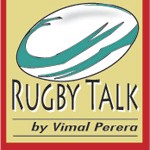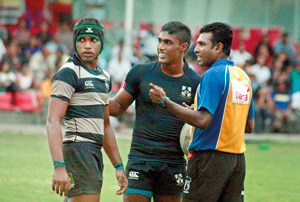Rat Race in Rugby — for whose benefit?
View(s):Kandy SC is in front of the Club Rugby League Tournament 2015/16 and are in total control while Havelocks SC are hanging on with a rare possibility of springing a surprise. CR and FC is running for the third slot. Navy SC after their defeat by Police SC are getting behind and chances depend on this week’s match against CR played at Welisara. Havelocks’ despite winning against Air Force SC did not impress. The most I liked in this game was the try scored by Air Force which saw good ball handling, offload and quick short passes which took the ball from outside the 22 to in-goal. The question is why they don’t do this all the time. Looking at the average skills displayed and the big names of a school season not able to perform raises a question of why?
 The schools will be in action starting with the Sevens in the last week of January. The pre- season talk always revolves around training and the methods as newcomers enter the portals of the game and parents start asking questions. Talk also center around the money spent by past pupils; who want wins and action forgetting that the youngsters are entering to enjoy a sport.
The schools will be in action starting with the Sevens in the last week of January. The pre- season talk always revolves around training and the methods as newcomers enter the portals of the game and parents start asking questions. Talk also center around the money spent by past pupils; who want wins and action forgetting that the youngsters are entering to enjoy a sport.
What props up to my mind is whether they are training for rugby or are entering a muscle man contest. The reason is because the tendency is for some to shift to building bodies than becoming a strong athlete. A perennial question is whether a young athlete below the age of 17 should be exposed to weights as against strength training. Are supplements a must for an athlete to develop. My advice is to consult an expert and the Ministry of Sports is more than willing and is eager to help. It is not a game for today but a foundation for life or at least a longer career in the game. What happens to all the bloated power house of school rugby as they take the next step in the player development to club rugby? Take a count and you will see the result.
Reading through a document of the National Collegiate Athletic Association (NCCA), I came across some comments that might be useful that will help not produce powder babies who are lots of bust but of little use as the rest cannot bear the weight.
The document says “For an athlete to maintain a healthy diet, it is essential to know not only what and when to eat, but also how to navigate through the mounds of advice marketed to enhance athletic performance. Experimenting with certain diets and performance-enhancing supplements may or may not help performance, but more critically, may lead to unintentionally consuming banned substances or suffering from potentially severe health consequences”.
That is the opening advice which might or might not help as there are many who heap advice and some are not those who are actually experts as proven recently in the case of a person who was claiming to be a doctor of medicine advising many including a well-known school. In the anti-doping drive if it is in your body you are responsible.
Another issue is the Fad Diets promising to meet weight-class goals? Many popular diets lure consumers by promising instant or substantial results. It goes on to say that while many of them may ‘work’, they tend to do so at the detriment of an athlete’s performance and health. They often cannot be maintained long-term and may not provide enough energy to support the demanding lifestyle of a student-athlete.

At times it’s not the behaviour of the players that takes the game to brief stoppages. Suppoters too ha ve an important tole to play
The researchers also say that supplements, the most marketed product among the athlete, have found its way to the young crowd in a big way. The often misunderstood topic in sports nutrition is dietary supplements. There is no magic pill, powder or liquid that will turn a student-athlete into an athletic powerhouse. These will, however, increase health risks, decrease performance and potentially show up positive on an NCAA banned-drug test. Therefore, it is extremely important for student-athletes, and those who work with student-athletes, to know what they are consuming.Supplements most often used by student-athletes are protein supplements, creatine, energy drinks, enhanced waters and nitric oxide supplements (NOS). Nitric Oxide supplements usually have not been proven effective in athletes. Likewise, while energy drinks and enhanced waters may increase short-term energy and performance due to carbohydrate and caffeine content, there is little to no research showing any of the other ‘active’ ingredients have an impact on performance. Some have side effects and it is better to get expert’s opinion.
The National Federation of State High School Association’s (NFHSA) Sports Medicine Advisory Committee (SMAC) strongly opposes the use of dietary supplements for the purpose of obtaining a competitive advantage. Research shows that there continues to be widespread use of dietary supplements by adolescent and high school athletes, despite considerable safety concerns. Dietary supplements are marketed as an easy way to enhance athletic performance, increase energy levels, lose weight, and feel better. Adolescents are more susceptible to peer pressure and these advertising messages, which may increase the incidence of dietary supplement usage and reinforce a culture more concerned about short-term performance rather than overall long-term athletic development and good health. The NFHSA-SMAC strongly opposes the use of supplements by high school athletes for performance enhancement, due to the lack of published, reproducible scientific research.
What is important is for coaches, athletic directors, and other school personnel to develop strategies that address the prevalence and growing concerns of using dietary supplements. The game of rugby is demanding and that demand can only be met through hard work. Supplements, if needed, have to be administered under the guidance of experts and specific to the requirements of each child. The future is more important than a short term desire for those who want to go back to school.
Vimal Perera is a former player, coach, referee and an IRB Accredited Referees’ Educator


